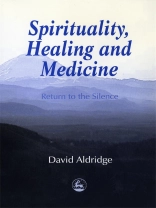The spiritual factors associated with healing are increasingly being acknowledged by modern medicine. Our definition of what constitutes health has expanded beyond the purely medical, yet the delivery of modern medicine to the patient often fails to take this into account. Doctors, anthropologists, psychologists and sociologists have all written on the subject, but thus far the literature has been fragmented between the disciplines.
David Aldridge presents the first unified approach to the subject. In Spirituality, Healing and Medicine he evaluates the existing literature from across the disciplines to ascertain just how effective and influential spiritual healing may be on the patient’s physical and psychological well-being. He encourages us to redefine treatment strategies and the ways in which we understand health, and argues that the spiritual elements of experience help the patient to find purpose, meaning and hope in the face of sickness. It is in the understanding of suffering and the need for deliverance from it, he suggests, that the traditions and aims of medicine and spirituality meet.
表中的内容
1. Healing narratives in the context of a performed life. 2. Meaning, purpose and power. 3. Religion: The everyday forms of spiritual life. 4. Lifestyle, charismatic ideology and a praxis aesthetic. 5. Lost and found. The perpetual story. 6. Prayer and healing. 7. Pluralism and treatment: Healing today. Index.
关于作者
David Aldridge is Professor of Qualitative Research in the Faculty of Medicine at the University of Witten-Herdecke. He is author of Music Therapy Research and Practice in Medicine: From Out of the Silence (1996) and Suicide: The Tragedy of Hopelessness (1998) also published by Jessica Kingsley Publishers.







![的封面 Brian Schrag & Julisa Rowe: Community Arts for God's Purposes [Chinese] 貼近神心意的社群藝術 的封面 Brian Schrag & Julisa Rowe: Community Arts for God's Purposes [Chinese] 貼近神心意的社群藝術](https://static.worldofdigitals.com/thumb_webp/740/9781645083740.webp)




